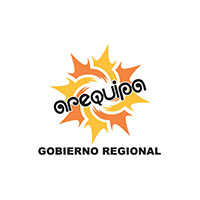Hay Festival Arequipa 2021
More info at +51 984346405 or infoperu@hayfestival.com
Event 18
Alessandro Maccarrone in conversation with Norka Bedregal
Pleasurable maths
Colegio de Abogados (auditorio)
Read moreSponsored by Credicorp and with the support of Acción Cultural Española, AC/E
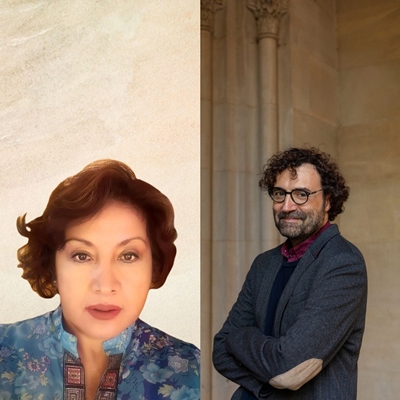
Event 19
Sheila Alvarado and Marisa Godínez in conversation with Álex Huerta-Mercado
Illustrators
Teatro Arequepay
Read moreThe artist Marisa Godínez (Lima, 1950) studied at the PUCP’s School of Art, and was a pioneer in feminist drawing in Peru. In 1978 she was invited to contribute to the satirical magazine Monos y Monadas with drawings whose subject matter was poetic and notably anti-patriarchal. This multi-talented artist, who uses a range of different media, returned to drawing in 2017 and in 2022 held the La Niña No Mirada exhibition at the Luis Miró Quesada Garland Gallery in Miraflores. Sheila Alvarado (Lima, 1979) is an artist, writer and LGTBI activist. She graduated from the National School of Fine Art, with a silver medal in printmaking. In 2019 she won the Peruvian Ministry of Culture’s Child and Young Adult Literature Prize. In 2020, she was one of the winners of the same ministry’s National Competition for Creative Child and Young Adult Literature Projects and a year later represented Peru as an illustrator and writer at the Guadalajara Book Fair. Both artists will talk to Álex Huerta-Mercado about activism through art.
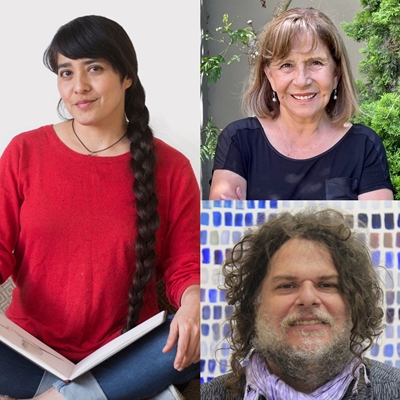
Event HFC3B
Lecture by Elisa Guerra
School in the era of Artificial Intelligence
COAR
Read more
Event HFJ9
Leontxo García in conversation with Gabriel Ñaña
Chess and writing
Universidad Continental
Read more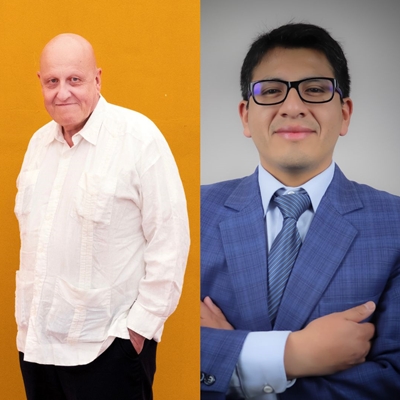
Event HFJ10
María Larrea, Enrica Pérez y Judith Vélez in conversation with Cintya Vera
Talking about film
Universidad Católica de Santa María - Campus Umacollo
Read moreSponsored by CAF
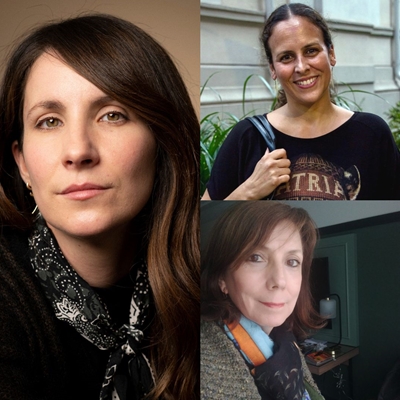
Event 20
Irene Vallejo in conversation with Patricia del Río
The invention of books
Teatro Municipal
Read moreSponsored by the BBVA Foundation

Event 21
Agustina Bazterrica and Hari Kunzru in conversation with Matías Zibell
Literary pairs
Centro Cultural Peruano Norteamericano (teatro)
Read moreAs part of the Literary Pairs series run by Hay Festival and the British Council, and an event that will be repeated at the Hay-on-Wye Festival in 2025, the BBC Mundo journalist Matías Zibell will talk to Agustina Bazterrica and Hari Kunzru. Agustina Bazterrica (Argentina) is a writer and cultural manager; as well as short story collections, she has published Tender Is the Flesh, translated into 25 languages, and the novel that she presents here: The Unworthy, a disturbing dystopian book that deals with the matter of friendship. The writer Hari Kunzru (United Kingdom), who has contributed to media outlets such as The New York Times, The Guardian and Wired, has been a fellow of the Guggenheim Foundation, the New York Public Library and the American Academy in Berlin. His novels have won a range of prestigious prizes and have been translated into over 20 languages. He presents Red Pill, a novel about the far right, online culture, creativity, sanity and history.
With simultaneous interpretation from English to Spanish
With the support of British Council
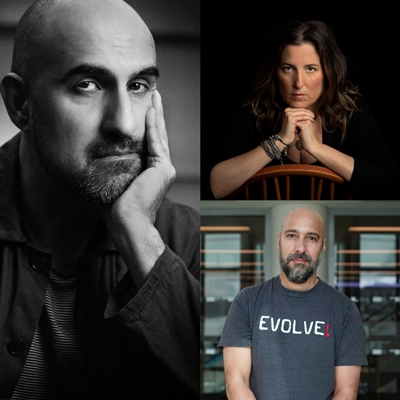
Event 23
Maritza Ramírez and Patricia Salas in conversation with Jorge Bedregal La Vera
Education and inclusion
Colegio de Abogados (auditorio)
Read moreTwo major figures from the world of Peruvian education will talk to Jorge Bedregal la Vera about the importance of education in strengthening social and community fabrics. Patricia Salas (Peru) is a sociologist and expert in matters related to social development; she has a doctorate in Social Sciences from the Universidad Católica de Santa María and has been both Chair of the National Council of Education and Peruvian Minister of Education. Maritza Ramírez (Peru) is a dedicated Kukama activist who works to revitalise the language, as well as on the promotion of bilingual and intercultural education in Peru through documenting the Kukama language, developing educational materials and creating teaching spaces. Her work has been recognised nationally and internationally for its significant impact on the promotion of inclusive education that respects cultural diversity.
Sponsored by Grupo Gloria
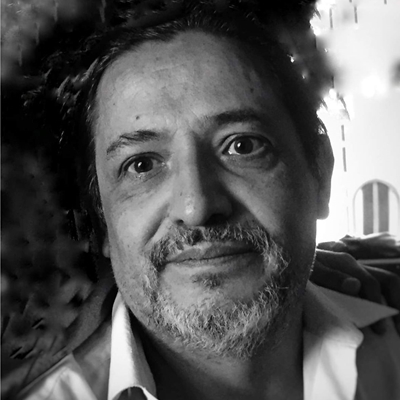
Event 24
Luis García Montero and Alonso Ruiz Rosas in conversation with Verónica Ramírez
Cultural fusions
Teatro Arequepay
Read moreWith the support of the Instituto Cervantes

Event 27
Screening of The Settlers
Centro Cultural Peruano Norteamericano (auditorio)
Read moreWith the support of the Embassy of Chile in Peru

Event 22
Felipe Gálvez in conversation with Alejandro Millán
The Settlers
Centro Cultural Peruano Norteamericano (auditorio)
Read moreWith the support of the Embassy of Chile
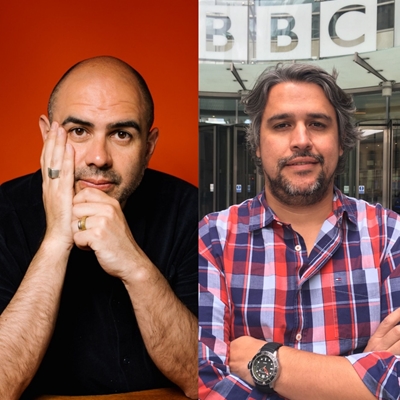
Event 25
Poetry gala
Teatro Municipal
Read moreSponsored by Cerro Verde and with the support of the British Council, the Romanian Embassy and the Instituto Cervantes

Event 26
Astrid Madimba and Chinny Ukata in conversation with Matías Zibell
Africa is a continent
Centro Cultural Peruano Norteamericano (teatro)
Read moreThe podcast and book It’s a continent are two of the best contemporary introductions to the history and current affairs of African countries intended for a broad public. Created and produced by two British communicators with African origins, Astrid Madimba and Chinny Ukata, it explores in an entertaining and accessible way the history of each African country, dismantling myths and celebrating the cultural and historical riches of a set of countries and peoples that constitute a very large percentage of the world population. Together with the BBC journalist Matías Zibell, Madimba and Ukata will tell us how the idea for the podcast arose, and why it is important to communicate the reality of each African country to a world that still has much to learn and a long way to go in terms of decolonising.
Simultaneous translation from English to Spanish available

Event 28
Gabriela Wiener in conversation with Liliana Colanzi, with the participation of Renata Flores
South to south conversations
Colegio de Abogados (auditorio)
Read moreWith the support of Open Society Foundations
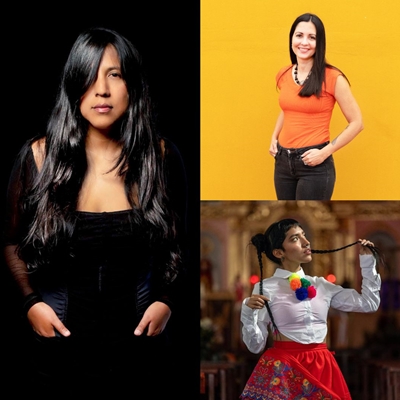
Event 29
Víctor Condori, Fiorella Quintanilla, Patricia Roberts and Julio Villanueva Chang talk to Omar Zevallos
Being Arequipan in the third decade of the 21st century
Teatro Arequepay
Read moreFor many, being from Arequipa is a true "nationality”. Is being arequipeño an attitude? Can Arequipans be born wherever they want? What are the characteristics of city locals? Is there a divorce between reality and assuming Arequipa identity, and is it a myth? To explore these questions, we invite Julio Villanueva Chang, author of No se nace en vano al pie de un volcán, a series of biographical sketches of five people born in the city of Arequipa, who, from a distance, can help us find some answers, or at least paths that might lead to them. Also featuring Víctor Condori, a historian born in Ilo and now living in Arequipa, co-author of Historia mínima de Arequipa; Fiorella Quintanilla, director of the UCSP Arts Centre; and Patricia Roberts, a prominent Arequipan poet. In conversation with the journalist Omar Zevallos, who will try to decipher “arequipeñismo” from different angles, aiming to find ways that allow us to glimpse better ways of living together in the city.
Sponsored by Universidad Continental
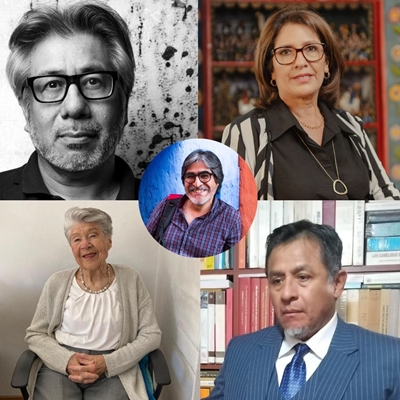
Event 30
Daniel Mordzinski and Irene Vallejo in conversation with Jeremías Gamboa
Literature in images
Teatro Municipal
Read moreSponsored by Cerro Verde

Event 31
Jean-Baptiste Del Amo in conversation with Felipe Restrepo Pombo
The Son of Man
Centro Cultural Peruano Norteamericano (teatro)
Read moreThe transmission of violence and trauma from one generation to the next is the foundation for the latest novel by the French writer Jean-Baptiste Del Amo. The Son of Man is the story of a man who returns to his partner and son after a long absence, and takes them to live in a remote place in the mountains, just as his own father had done with him. Soon the mother and child feel oppressed by the control of a man tormented by his own relation with his father before him. In conversation with Felipe Restrepo Pombo.
Simultaneous interpretation from French to Spanish available
With the support of the French Embassy in Peru

Event 32
Xabier Díaz de Cerio in conversation with Angelina Ferrero
The ABC of Peru’s climate
Centro Cultural Peruano Norteamericano (auditorio)
Read moreSponsored by TGP

Event 33
Carlos Bardem and Hugo Coya in conversation with Teresa Ruiz Rosas
Cuadernos hispanoamericanos
Colegio de Abogados (auditorio)
Read moreCuadernos hispanoamericanos aims to promote knowledge and exchange between writers of different generations and nationalities, united by a single language and literary tradition, enriched by authors of diverse origins. At this event, Carlos Bardem, a well-known Spanish actor and writer, presents his latest book, Badaq, transporting us to 1583 where, through the eyes of a rhinoceros carried to Madrid as a gift for King Phillip II, the novel criticises the exploitation and corruption of the Spanish Empire. Also with Hugo Coya (Peru), the renowned journalist, television producer, university lecturer and public speaker, who presents El espía continental, a kind of spin-off of El último en la torre (2022) which explores the political turmoil of 1930 in Mexico and the life of Jacobo Hurwitz, an enigmatic spy who had Peruvian and Jewish roots. Both authors, known for their literary skills and for their contributions to historical understanding and reflection through fiction, will talk to Teresa Ruiz Rosas about the colonial past.
Carlos Bardem will join the event remotely
With the support of AECID
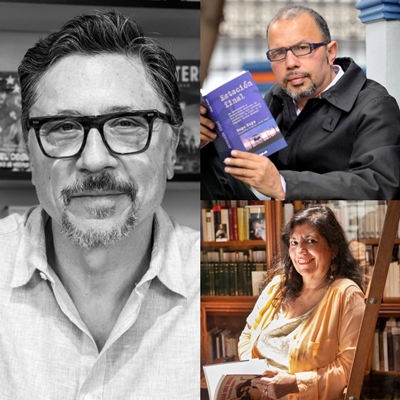
Event 57
Luis Llosa in conversation with Enrique Planas
Film and literature
Teatro Arequepay
Read moreWith the support of El Comercio
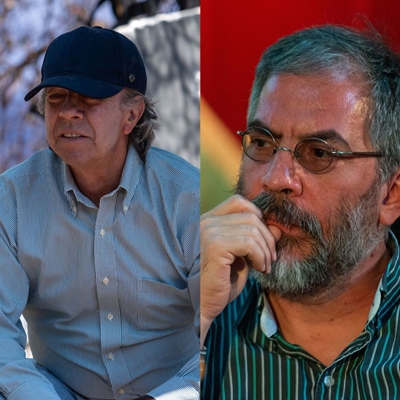
Event HFC4
Performance by children from the Hogar de Cristo home
Plaza San Francisco
Read moreThe girls and boys of the Hogar de Cristo home bring their special energy to the opening of the Hay Festivalito, sharing what they have learned at their dance, music, reading and games workshops. This will be an artistic presentation that invites the audience to participate in a musical performance, created by the performers themselves. With a little imagination, household objects become musical instruments. At the Hogar de Cristo home, the main theme for 2024 is respecting and protecting Mother Earth and all the workshops aim to deal with this very urgent matter. Hogar de Cristo has become involved in the Arequipa initiative “One tree, one life” in order that children understand, in greater depth over time, the significance of and need to protect, water and plant, in every sense of the terms. Music, song and dance are the food of the soul and we invite audiences to enjoy the classic Andean folk of the Hogar de Cristo, El árbol de la queñua es vida.
With the support of la Municipalidad Provincial de Arequipa
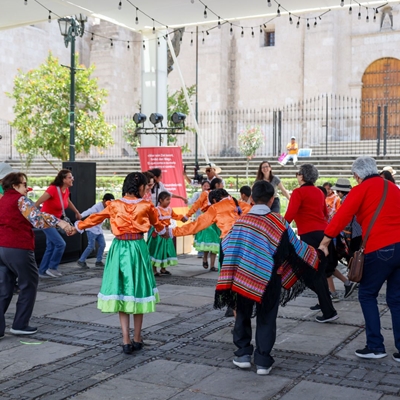
Event HFC5
Storytelling with Patricia del Río and Doris Zuzunaga
Desde la luna
Plaza San Francisco
Read moreWith the support of la Municipalidad Provincial de Arequipa

Event 35
Philippe Sands in conversation with Felipe Gálvez
The last colony
Teatro Municipal
Read morePhilippe Sands (United Kingdom) is a well-known human rights lawyer and author of acclaimed works such as East West Street and The Ratline, and at this event he will talk to Felipe Gálvez about his most recent book, The Last Colony. Sands tells the painful story of the forced displacement of Liseby Elysé and other inhabitants of the Chagos archipelago in 1973, due to the strategic interests of the Cold War. Displaced to Mauritius in order to make room for a US military base, this book condemns British colonial injustice and its effects. With a story that includes history, essay and personal drama, Sands reveals the human tragedies behind the great historical events, underlining the need for justice and reparation, exploring the recent history of Chile and taking as a point of departure the lives and works of iconic figures such as Bruce Chatwin, Roberto Bolaño and the dictator Augusto Pinochet.
Simultaneous translation from English to Spanish available
With the support of the British Council and the Embassy of Chile
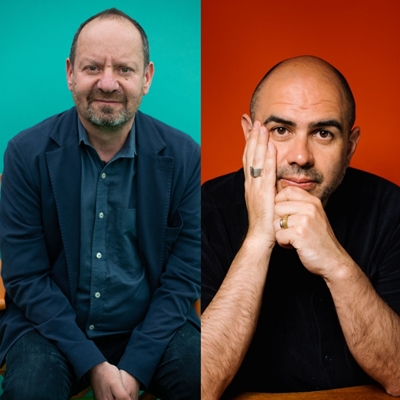
Event 36
Screening of the documentary Camino de los sueños
Followed by a conversation between Savas Coban and Alejandro Millán
Centro Cultural Peruano Norteamericano (teatro)
Read moreThis extreme sportsman has set un unthinkable record: running 86 ultramarathons in 86 days. 60 km per day. Over 5,170 km in total. Between November 2022 and February 2023, the athlete ran through all the geographical zones and climates of Peru. He undertook his challenge accompanied by a camera, and now stars in the documentary that tells his story: Camino de los sueños. Savas Coban, a German of Turkish origin, talks about his run through Peru with the BBC journalist Alejandro Millán.
Duration of the documentary: 90 min
Simultaneous interpretation from German to Spanish available
With the support of the German Embassy

Event 37
Andrea Ortiz de Zevallos and Teresa Ruiz Rosas in conversation with Jorge Malpartida Tabuchi
Centro Cultural Peruano Norteamericano (auditorio)
Read moreTwo well-known writers talk about their work with Jorge Malpartida Tabuchi. With Andrea Ortiz de Zevallos (Peru), who presents her novel Madre de Dios, an ecothriller set in the region of the same name, which reflects on the nature of ecocide; and the Arequipa writer and translator Teresa Ruiz Rosas, finalist for the prestigious Herralde Novel Prize in 1994 for El copista, a landmark work of contemporary Peruvian literature, which has been republished this year.
Sponsored by the Instituto Cultural Peruano Alemán
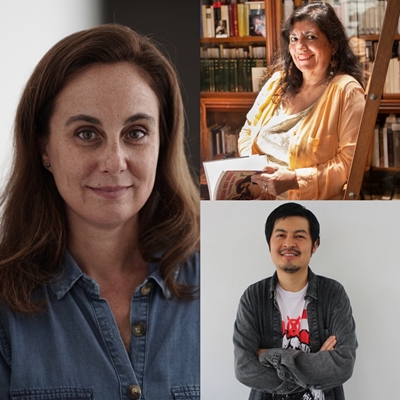
Event 38
Dina Ananco Ahuananchi, Christian Bendayán and Stefano Varese in conversation with Alessandra Yupanqui
A letter to the Amazon
Teatro Arequepay
Read moreSponsored by TGP
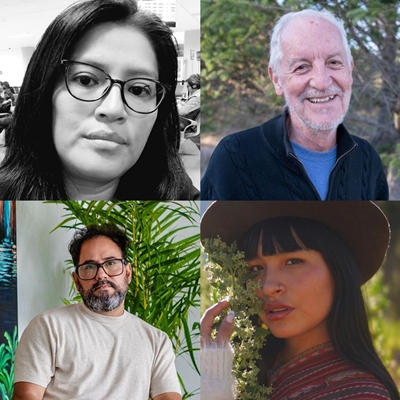
Event 42
Farid Kahhat in conversation with Zaraí Toledo
The radical right
Colegio de Abogados (auditorio)
Read more
Event HFC6
José Carlos de la Puente and Sergio Vilela
Machu Picchu. A mystery among the clouds
Plaza San Francisco
Read moreFind out how Machu Picchu was constructed. Discover all the ingenuity of the Inca civilisation when it came to great architectural achievements. Understand how ancient societies faced technical, geographical and social challenges when carrying out monumental projects such as Machu Picchu. This masterclass inspires and motivates children to seek creative and innovative solutions to face contemporary challenges. Furthermore, it will teach them to appreciate the cultural heritage of humanity and understand the importance of preserving these historical monuments for future generations. With José Carlos de la Puente and Sergio Vilela.
With the support of la Municipalidad Provincial de Arequipa

Event HFC7
Workshop with Karina Villalba
Explorers of Machu Picchu. Wonder in 3D
Mercado San Camilo
Read moreWith the support of la Municipalidad Provincial de Arequipa
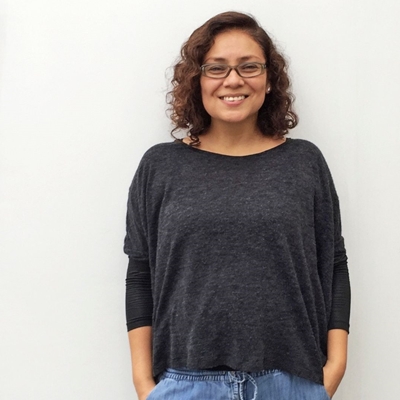
Event HFC8
Performance by the Arequipa branch of the Peruvian Children’s Symphony Choir
Plaza San Francisco
Read moreWith the support of la Municipalidad Provincial de Arequipa

Event 39
Edmundo Paz Soldán and Giacomo Roncagliolo in conversation with Patricia del Río
Literary dystopias
Centro Cultural Peruano Norteamericano (auditorio)
Read more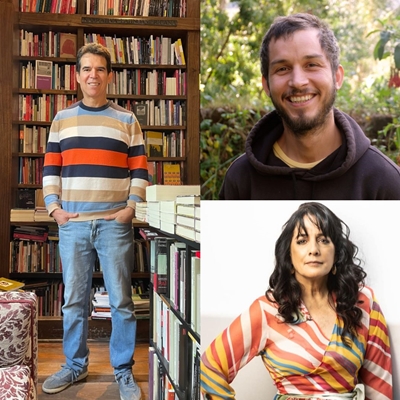
Event 40
Roberto Chang and Zaraí Toledo in conversation with Carlos Paredes Lanatta
The Peruvian economy and its challenges
Teatro Municipal
Read moreSponsored by SURA
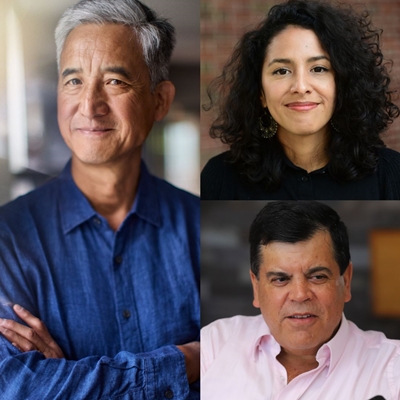
Event 41
Karina Pacheco in conversation with Verónica Ramírez
Centro Cultural Peruano Norteamericano (teatro)
Read more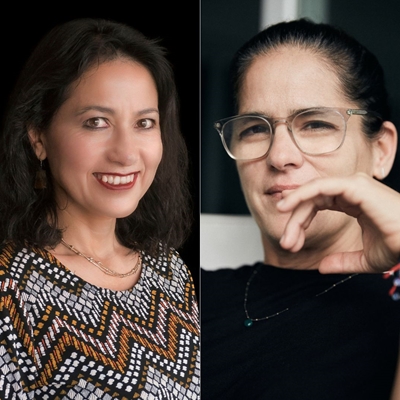
Event 43
Leontxo García and Julio Ernesto Granda in conversation with Felipe Ortiz de Zevallos
Long live chess
Colegio de Abogados (auditorio)
Read moreSponsored by Credicorp
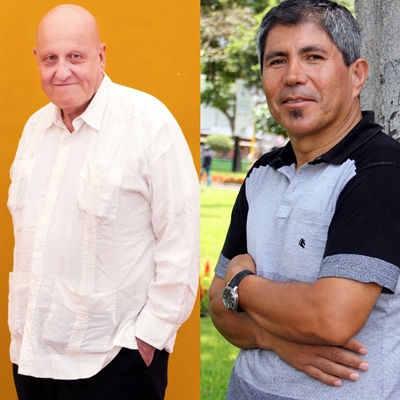
Event 44
Rocío Silva Santisteban and Iban Zaldua in conversation with Jorge Malpartida Tabuchi
The art of the story
Teatro Arequepay
Read moreWe talk to two eminent writers. Rocío Silva Santisteban, Peruvian writer, poet, academic and former member of parliament, is also a researcher and Executive Secretary of the National Department for Human Rights. She has written poems and short stories, published in books such as Me perturbas and Reina del manicomio. She now presents El Quemadero. Cuentos reunidos, a compilation of short stories. The writer and historian Iban Zaldua (Basque Country, Spain) present A escondidas, a revised and enriched version of stories originally published in Inon ez, inoiz ez (2014). This new collection, translated by the author from Basque into Spanish, mingles the fantastic and the real to explore human contradictions and subvert reality, deconstructing it and tackling themes such as humour, climate change and artificial intelligence. They will talk to the writer and journalist Jorge Malpartida Tabuchi, author of the short story collection Contra toda autoridad, excepto…
With the support of the Instituto Etxepare
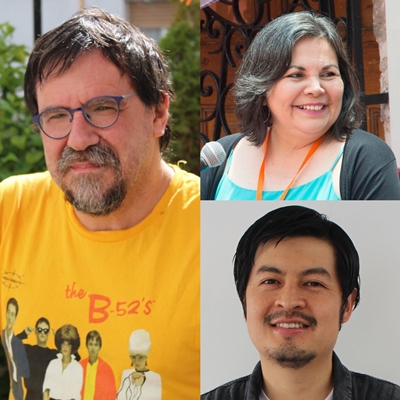
Event 45
Natalia Sobrevilla and Irene Vallejo in conversation with Magally Alegre Henderson
Societies of the archive
Casa Tristán del Pozo - Fundación BBVA
Read moreHistorical archives are sources of an incalculable value for understanding the past, present and future of nations. Natalia Sobrevilla is a historian, researcher and lecturer in the History of Latin America at the University of Kent (United Kingdom), and is also the author of Independence and Nation Building in Latin America. In the context of the crisis affecting the National General Archive, we want to highlight the importance of protecting this legacy, which belongs to all citizens. In her contemporary classic, Papyrus: The Invention of Books in the Ancient World, Irene Vallejo explores the development of the book and libraries in the ancient world, and how they became effective ways for transmitting and preserving ideas, while also pointing out that “a dislike of books is a tradition with strong roots in our history”. In conversation with the Head of the Riva-Agüero Institute’s Historical Archive, Magally Alegre Henderson.
With the support of the Eccles Institute for the Americas
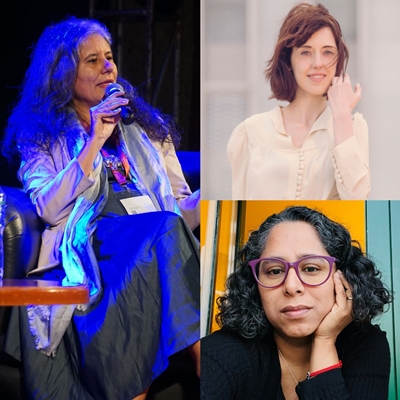
Partner for Latin America

Principal Sponsors



Government Partner
